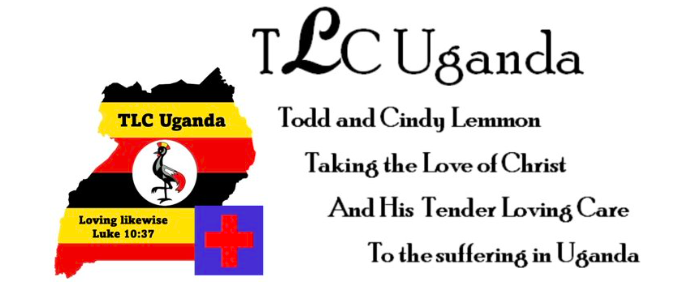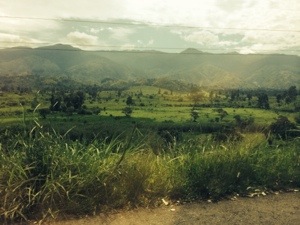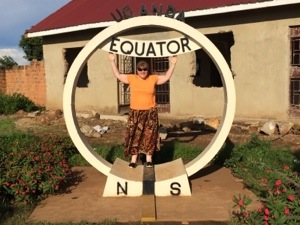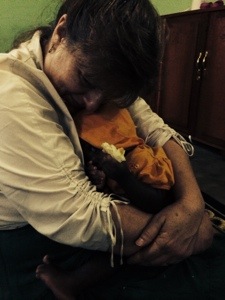Day Seven, April 21:
Up before dawn which, at the equator, is always 7am, we finally got to experience one of the infamous Ugandan power outages. We were told that it had been an Easter miracle that our power had only been off for a few hours one night while we were sleeping, but now it was out for real, and just as we were needing to pack and leave. Laurie Dickerson, Carol's houseguest, had the place nicely illuminated with candles, and was browning toast in a skillet on a gas-burning stove for us. Laurie is a missionary herself, a pastor of the Four Square Church. She has been quite the helper and well of advice and anecdotal reference. She let us know when our plans were too crazy to be carried out, but I think we left Carol and Laurie both fairly convinced we were crazy, maybe just crazy enough.
It was tough to say goodbye, but Anthony's urging and his warning that we really needed to arrive in Gulu by dark was enough to get us going. It seemed like such a short stay!
As we left the Fort Portal area, we left behind the wealth and cleanliness of their community too. I noticed even the soil seemed less rich, as the clay began to turn from a dark red to a more yellow orange. The clothing of the people we passed got dingier and a little more tattered, though it was still dresses, trousers and dress shirts, short-sleeved ones began to appear, some with holes torn in them from wear and t-shirts began to show up in greater number. The houses got a little farther apart, and a little more run-down, and I felt like we had crossed over into a more rural Uganda.
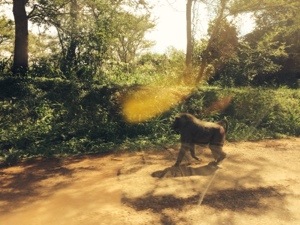 As Cindy and I began to doze Anthony woke us up with the call, "baboons!" There along the side of the road as we crossed through the Budongo Forest, was a group of baboons, pretty as you please! Neither Cindy nor I could get to a camera fast enough to prove it, but Anthony assured us they would be along the road in several places. Sure enough, eight million potholes later, as we wound our way through the clay obstacle course that passes for a road in Northwest Uganda, as we skirted the Murchison Falls National Park, Uganda's largest game park, we encountered dozens of baboons, all lining the highway as if on display. A few seemed as interested in us as we were in them, but we didn't stop, and we kept in mind the advice we got from Laurie earlier: don't open your windows around baboons no matter what. Apparently baboons are very curious and also aggressive.
As Cindy and I began to doze Anthony woke us up with the call, "baboons!" There along the side of the road as we crossed through the Budongo Forest, was a group of baboons, pretty as you please! Neither Cindy nor I could get to a camera fast enough to prove it, but Anthony assured us they would be along the road in several places. Sure enough, eight million potholes later, as we wound our way through the clay obstacle course that passes for a road in Northwest Uganda, as we skirted the Murchison Falls National Park, Uganda's largest game park, we encountered dozens of baboons, all lining the highway as if on display. A few seemed as interested in us as we were in them, but we didn't stop, and we kept in mind the advice we got from Laurie earlier: don't open your windows around baboons no matter what. Apparently baboons are very curious and also aggressive.
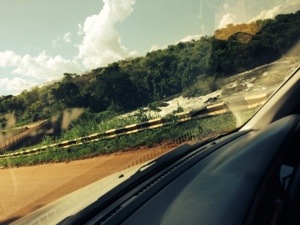 We crossed the Nile River and were both surprised to see a beautifully roaring river over rocks and falls, rather than the long sleepy hippo watering hole we had both pictured in our heads. I guess the Congo River Rapids ride at Busch Gardens was named for this part, not the sweet stream that gently brought Moses to Pharaoh's daughter. Speaking of Congo, we spent the day paralleling the mountain chain that separates D. R. Congo from Uganda. We could only imagine what was going on just the other side of those mountains.
We crossed the Nile River and were both surprised to see a beautifully roaring river over rocks and falls, rather than the long sleepy hippo watering hole we had both pictured in our heads. I guess the Congo River Rapids ride at Busch Gardens was named for this part, not the sweet stream that gently brought Moses to Pharaoh's daughter. Speaking of Congo, we spent the day paralleling the mountain chain that separates D. R. Congo from Uganda. We could only imagine what was going on just the other side of those mountains.
After we crossed the Nile was when I think we began seeing the round mud huts with thatched grass roofs one sees in storybooks about African people. These huts, though, were really neatly made, most appeared cleanly kept, and efficient for their purpose and the climate. I was amazed at how nice some were. Painted with solid doors, some had clothes lines strung between them. Others had laundry drying right on the grass roof. Seeing the ventilation and the thick layers of grass used in the construction, I began to feel sorry for the folks in rectangular brick houses under tin roofs in the equatorial sun.
As we neared our destination much earlier than we had feared, Anthony announced he was hungry much to my relief. We stopped at a roadside restaurant in Kamdini and had some chicken and rice to tide us until supper. Nancy Cordoza, our Gulu hostess, had prepared us dinner so we kept our late lunch light. It was a compromise for me to eat at a roadside restaurant, given the health concerns, but I prayed extra fervently over it and God kept it from being a problem. Cindy, however, had exhausted our supply of G-nuts while we weren't looking, and was too full for roadside fare. She amused herself taking pictures of me taking the adventuresome risk.
Nancy met us at a landmark hotel near her house because (and she is not the first) meeting us and directing us in was easier than giving directions on unnamed (or at least unmarked) roads. When we arrived at her compound, we were shocked at the aesthetic appeal. Even the walls and gates were ornate. The house was no different. Nancy explained the rental process and the fact there are no public utilities was how she found such a bargain, but she makes a lack of refrigeration and laundry work well for her, and we found it comfortable too. Cooking with gas, assisted by a pressure cooker, she prepared us a Ugandan dinner of beans, rice, chicken, bananas, and odie (G-nut sauce).
She made her home our own as she described her ministry to the local Acholi women. She is currently running a quilting group and looking for marketing venues in the U.S. And Canada, to help the women support themselves. She showed us some of the quilts and they were very nice. This group meets on Tuesdays, so we will join them tomorrow.
I got to talk to my daughter briefly tonight, in an attempt to resolve my banking issue, but it's way past bedtime. So good night.
